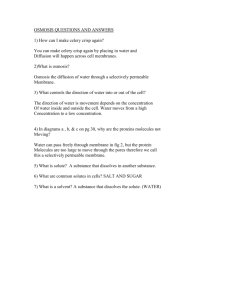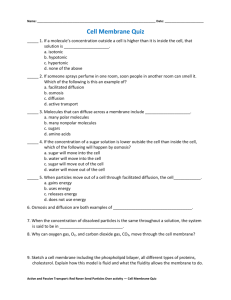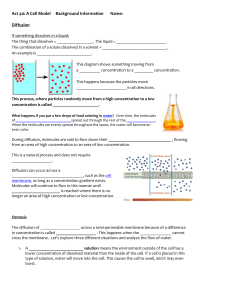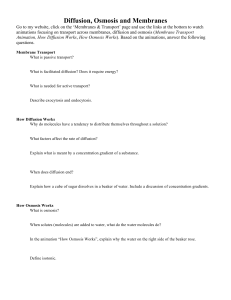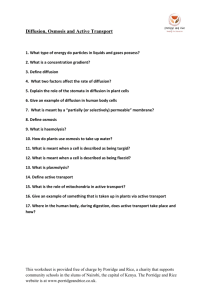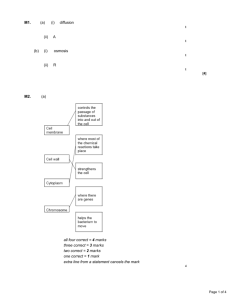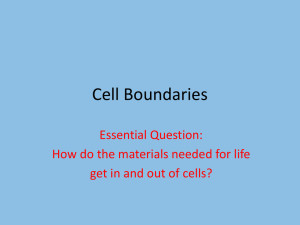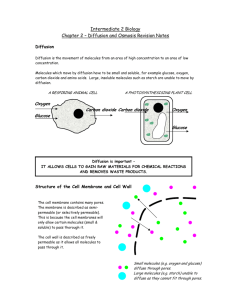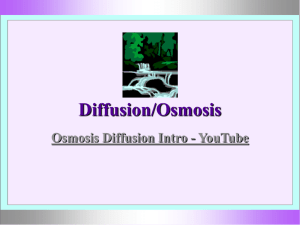Rachel Hurlbut Sept 3 Bio 10 Diffusion Diffusion Osmosis Osmosis
advertisement
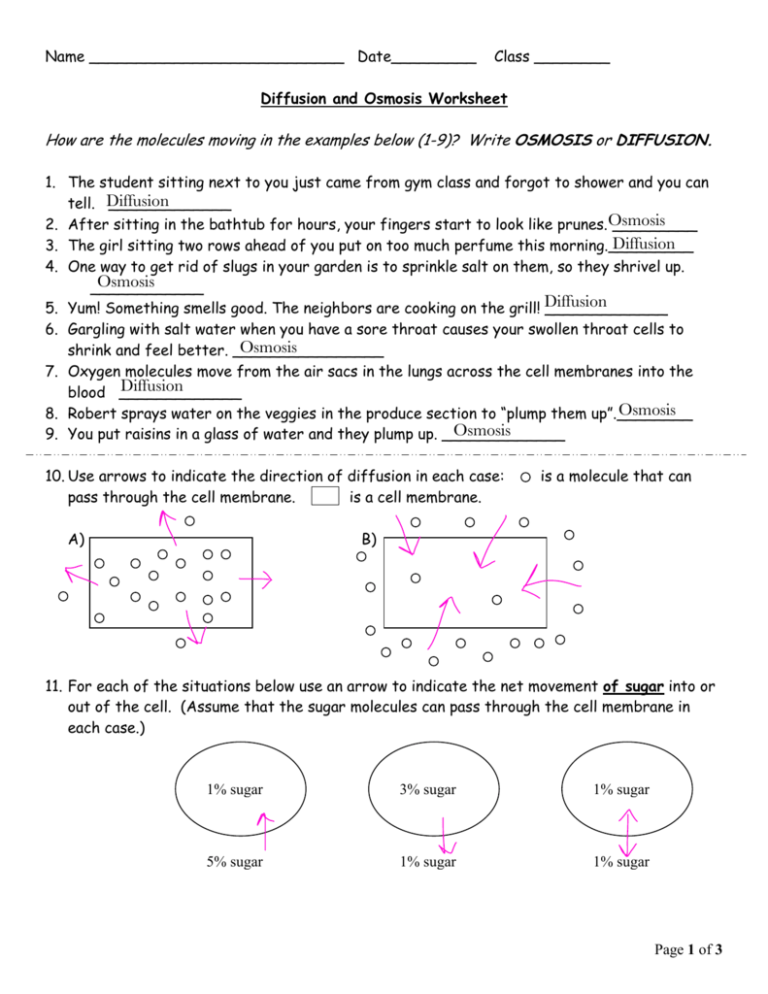
Rachel Hurlbut Sept 3 Name ___________________________ Date_________ Bio 10 Class ________ Diffusion and Osmosis Worksheet How are the molecules moving in the examples below (1-9)? Write OSMOSIS or DIFFUSION. 1. The student sitting next to you just came from gym class and forgot to shower and you can tell. Diffusion _____________ 2. After sitting in the bathtub for hours, your fingers start to look like prunes.Osmosis _________ Diffusion 3. The girl sitting two rows ahead of you put on too much perfume this morning._________ 4. One way to get rid of slugs in your garden is to sprinkle salt on them, so they shrivel up. Osmosis ____________ 5. Yum! Something smells good. The neighbors are cooking on the grill! Diffusion _____________ 6. Gargling with salt water when you have a sore throat causes your swollen throat cells to Osmosis shrink and feel better. ________________ 7. Oxygen molecules move from the air sacs in the lungs across the cell membranes into the Diffusion blood _____________ Osmosis 8. Robert sprays water on the veggies in the produce section to “plump them up”.________ Osmosis 9. You put raisins in a glass of water and they plump up. _____________ 10. Use arrows to indicate the direction of diffusion in each case: pass through the cell membrane. is a cell membrane. A) is a molecule that can B) 11. For each of the situations below use an arrow to indicate the net movement of sugar into or out of the cell. (Assume that the sugar molecules can pass through the cell membrane in each case.) 1% sugar 3% sugar 1% sugar 5% sugar 1% sugar 1% sugar Page 1 of 3 ilayer 12. The cell membrane is made of a p__________________ b_________________. hospholipid 13. The cell membrane is _________________permeable. This means that ____________ selectively it has the capability to let some substances in, and keep others out _______________________________________________________________. high 14. Diffusion always causes particles to move from a region of _______________ concentration to a region of ______________ concentration. low 15. Does a cell use energy when molecules diffuse in or out of the cell down the concentration No gradient?____________ Active transport 16. _____________________ requires energy (ATP) to transport molecules against a concentration gradient. Osmosis Diffusion 17. In _____________________ and _________________ no energy is used. Which one needs Osmosis a helper to get things across? _______________________ Match each term on the left with the best descriptor on the right. Use each only once. 18. Concentration ______ 19. Diffusion ______ 20. Equal amount of water inside a cell as outside______ 21. More water outside a cell than inside______ 22. Osmosis______ 23. More water inside a cell than outside ______ 24. Selectively permeable membrane _______ Descriptor a) Moves particles like oxygen into cells b) Amount of a substance in a certain place c) Moves water into and out of cells d) Allows some substances through e) f) g) 25. You have just bought a tropical fish for your freshwater aquarium. Unfortunately, you do not realize it is a saltwater fish. Using your knowledge of osmosis, explain why this fish will Because of osmosis, the fresh water will move from an not survive in your aquarium. ________________________________________ area of high concentration to an area of low concentration (the fish) and so the fish will _________________________________________________________________ bloat and die. _________________________________________________________________ Page 2 of 3 Fill in this table. Write whether solutes and water move INSIDE the cell or OUTSIDE the cell. Hint: With diffusion, solutes move from an area of high concentration to an area of low concentration. Hint: With Osmosis, wherever more salt is, water follows! Or, water also goes from an area of high amount of water to an area of low amount of water. DIFFUSION OSMOSIS Does the SOLUTE move inside or outside the cell? Does WATER move inside or outside the cell? 26. 28. 30. 32. 34. 36. 38. 40. 42. 27. 29. 31. 33. 35. 37. 39. 41. 43. intracellular fluid (inside the cell) 5% salt 10% salt 3% glucose 2% protein 9% salt 13% water 59% water 90% water 74% glucose extracellular fluid (outside of the cell) 10% salt 10% salt 1% glucose 1% protein 9% salt 25% water 45% water 92% water 87% glucose 44. Draw the cell membrane. Include the following: Phospholipid bilayer-Draw the hydrophilic heads (color red) and hydrophobic tails (draw in blue). Proteins-Draw the embedded proteins (color orange) Label which side is the INSIDE of the cell and which side is the OUTSIDE of the cell. Page 3 of 3
